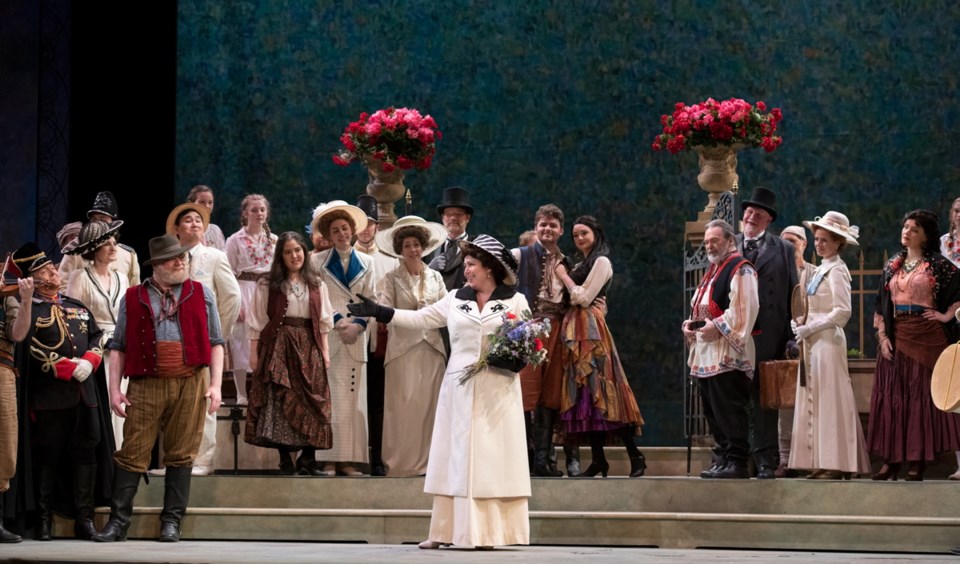REVIEW
What: Pacific Opera Victoria: Countess Maritza, by Emmerich Kálmán
When: April 27 and Friday, May 3, at 8 p.m.; Sunday, May 5, at 2:30 p.m.
Where: Royal Theatre
Tickets: $27-$144. Call 250-386-6121; online at ; in person at the Royal Theatre box office
Details:
Emmerich Kálmán (1882-1953) was a Hungarian composer who spent much of his life based in Vienna and became a leading exponent of Viennese-style operetta in its last flowering during and after the First World War.
Gräfin Mariza (Countess Maritza), a light romantic comedy first mounted in Vienna in 1924, was among his most successful operettas, though you won’t encounter it often today, especially outside Central and Eastern Europe. In 2018-19, according to Operabase’s statistics, it has been produced only 14 times around the world, less often even than two other operettas by Kálmán.
Indeed, Pacific Opera Victoria’s production of Countess Maritza, which opened on Thursday, is evidently the only production of any Kálmán operetta in North America this season. POV’s welcome decision to offer it allows us to see what the statistics do not show: that this is a musically splendid work, one of the peaks of its genre. The company was rewarded on Thursday with a lusty ovation from a plainly delighted audience.
In Countess Maritza, the language is Viennese, but the accent is Hungarian. The story revolves around aristocrats on an estate in the Hungarian countryside, and the score is rife with the Hungarian-Gypsy style beloved of 19th-century Central European composers. (There is even an on-stage violin-cimbalom duo.) But this cannot be mistaken for an operetta from the heyday of Johann Strauss II, for the score is also redolent of popular music of the early 20th century— palm court, music hall, Broadway.
Timothy Vernon, POV’s artistic director, studied in Vienna as a young man and has abundant affection for and insight into Central European repertoires requiring a special stylistic touch.
Conducting the Victoria Symphony and a faultless cast, Vernon gives a buoyant, sparkling, passionate account of Kálmán’s score. He revels in nuances that underscore characteristic details of the Viennese and Hungarian idioms, and draws out the pervasive sense of nostalgia that was part of this operetta’s effect even when it was new. Moreover, there is nothing winking or self-conscious about Vernon’s approach to this genre. He treats the work not as a bon-bon, but as a masterpiece rich in genuine, affecting sentiment.
Vocally, Countess Maritza is primarily a vehicle for sopranos and tenors, for whom there are plentiful solos and duets. The principals are all impressive as both singers and actors, tackling the particular stylistic demands of operetta with conviction and considerable personal charm.
Soprano Leslie Ann Bradley is immensely personable in the title role, and her voice sounds powerful and bright but also ingratiating, while soprano Suzanne Rigden, as Lisa, has a light, clear, sweet tone beautifully appropriate to the genre. The tenors, too, are very strong. Michael Barrett is endearingly goofy as Baron Zsupán, while Adam Luther, as Count Tassilo, is engagingly ardent and his voice remains attractive even at hall-filling volume.
There is entertaining work in the smaller sung and spoken roles, too — soprano Jennifer Taverner as the sultry Gypsy fortune-teller Manja, for instance, and baritone Bruce Kelly as the crusty, cynical Prince Popolescu. The production gets a big boost of energy from the late appearance of veteran Canadian actress Nicola Cavendish, who offers a masterclass in comedy as Princess Bozena, assisted with infectious flamboyance by Brian Linds as her servant, Penizek.
Both the songs and the spoken dialogue are performed in English, and surtitles are projected during the musical numbers. (The English rendering of the song lyrics deserves no prizes for literary elegance or for perfect matching of text to music.) The principals have all been miked, though audibility is sometimes inconsistent.
Patrick Clark has designed a single simple, versatile set with a lovely, Seurat-like, colour-dappled backdrop, and his 1920s-era costumes are notably lavish and beautiful. Director Linda Brovsky has mounted a show that is both funny and touching, and her staging always seems animated, natural and efficient in both the intimate scenes and the many busy sequences involving the chorus.



